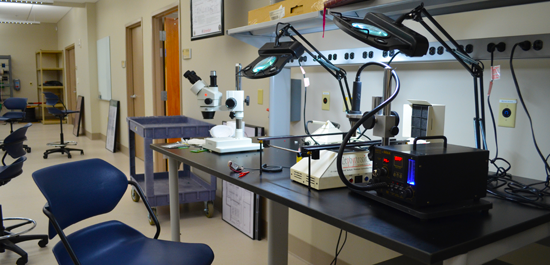Home » Research » Power Systems
Power Systems

Integration of Renewable Energy Sources
- Adaptive control for intemittent wind energy and STATCOM
- Ocean thermal energy conversion dynamic study (OTEC, Lockheed Martin)
- Power electronics control with high penetration of renewables in the utility grid
- Converter control for wind turbines
- Multilevel converters interface with solar panels and grid
- Integration of energy storage with wind generation for improved dynamics (Sandia National Lab)
Distributed Generation and Microgrids
- Voltage control using multiple distributed energy resouces (DOE/ORNL)
- Frequency and voltage control for microgrid (DOE/ORNL)
- Decentralized control of DE for voltage regulation in distribution systems
- Microgrids and DC distribution
- Impedance-based modeling and control of power electronics for grid integration of renewable energy (GE GRC)
- DC micro grid for the integration of renewable energy and energy storage technologies (NYSERDA, Ultralife)
- Smart grid voltage stability and control (NSF)
- Offshore wind farm system architecture and control; small-signal stability of offshore wind with HVDC transmission (GCEP/Stanford University)
- Stability and power quality of distribution network with deep penetration of renewable energy and distributed generation (NYSTAR)
Wide-Area Measurements and Control
- FNET - Frequency Monitoring Network (NSF, EPRI, DOE, ABB, TVA, FNET Industry Consortium)
- NERC Frequency response initiative (ORNL/DOE)
- Magnetic field and electric field based non-contact PMUs (EPRI)
- Oscillation and islanding detection (MISO)
- Wide-Area measurement applications (ISO-NE, First Energy, PJM, AEP, NYISO)
- Authentication of digital evidence using power system frequency measurements (NIJ)
- Advanced reactive power dispatch of multiple FACTS controllers to enhance the voltage stability of a large metropolitan load area (EPRI, KEPRI)
- Control of power grid with large penetration of renewable energy (GCEP/Stanford University)
Electricity Markets
- Ensuring security and reducing price volatility with high penetration controllable loads and renewable energy (NSF)
- Modeling of long-term transmission expansion and investment
- Network-based simulation of the effects of power-sector environmental policies, including Regional Greenhouse Gas Initiative
- Econometric estimation of air pollution transfer coefficients for Canada and econometric test for carbon dioxide emissions leakage resulting from Regional Greenhouse Gas Initiative
- Experimental testing of automatic wholesale electricity price mitigation and of market designs for reactive power and reliability
- Design of restructured electricity markets in Arizona, Pennsylvania, Maine, Nevada, Delaware, and nationally, and prediction of effect of electric-sector restructuring on prices in Colorado
- Design of State of Maryland renewable energy portfolio standard, rules for environmental labeling of electricity, and energy efficiency standards for equipment and appliances, subsequently adopted in other states and nationally.
Modeling and Analysis
- Data driven dynamic modeling of Eastern Interconnection Power Grid (EPRI)
- Modeling of induction motor loads and prevention of stalling using distributed energy resources (DERs)
- Power transformer modeling, diagnosis, and monitoring (multiple sponsors: NSF, EPRI)
- Phasor measurement unit (PMU) measurements: Their incorporation into state estimation, observability analysis and bad data processing
- Modeling of external systems using sparsely distributed PMU measurements
- Multi-area very large scale state estimation
- Robustness in state estimation
- Computational issues in very large scale network analysis
- Development of a non-iterative state estimator, an integrated phasor data concentrator, and cyber security aspects of phasor data communications (NYSERDA, NYPA)
Power Systems Operation
- Responsive load demonstration for smart grid application (EPRI)
- Optimal power system restoration
- An electric grid situational awareness toolkit
- Congestion prediction in power system operation and planning
- Self-healing power grid realization based on PSS/E 30 cascading failure simulation and analysis
- Multiple FACTS device coordination and control (NSF)
- Analysis of societal events' Impact on the power system frequency using FNET measurements
Power Conversion
- Vehicle to Grid (V2G) reactive power compensation from plug in hybrid electric vehicles
- Power quality – active filtering, STATCOMs
- High efficiency converters for data centers
- Modeling and application of SiC and GaN power electronics
- High-density converters for vehicle and aerospace applications
- High-temperature, high-density packaging for power electronics
- Ultra-reliable deepwater electrical power distribution system and power components
- Fault tolerant electromechanical energy converters for naval applications
- Integrated design methodologies for high performance electric drives
- Vibration-based energy harvesting systems


